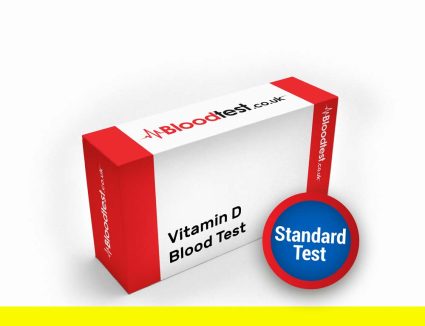Discover the Importance of a Vitamin D Blood Test for Your Health Journey
Understand the Crucial Roles of Vitamin D for Your Overall Well-being

The vitamin D blood test available in Coalville plays a pivotal role in evaluating your vitamin D levels, which are vital for maintaining bone health, bolstering the immune system, and promoting overall vitality. Insufficient levels of vitamin D can lead to a range of health issues that extend well beyond mere bone health. The multifaceted nature of vitamin D in various bodily functions highlights the importance for individuals of all ages to keep track of their vitamin D status. Here are some significant benefits linked to maintaining optimal vitamin D levels:
- Strengthens bones and teeth
- Boosts immune system efficiency
- Enhances mood and mitigates the risk of depression
- Facilitates calcium absorption
- Improves muscle performance
- May reduce the risk of chronic diseases
- Supports cardiovascular health
- Helps regulate insulin levels
Given its wide-ranging benefits, ensuring your vitamin D levels are optimal is essential for a healthy lifestyle, particularly in areas such as Coalville, where limited exposure to sunlight can hinder the natural synthesis of vitamin D due to varying weather conditions.
Prefer Listening to Audio for Ease of Understanding?
 What to Expect During the Vitamin D Testing Process?
What to Expect During the Vitamin D Testing Process?
The vitamin D blood test is a simple and effective procedure that typically involves collecting a small blood sample from a vein in your arm. This sample is then forwarded to a laboratory for thorough analysis, where qualified technicians evaluate the concentration of vitamin D in your bloodstream. The entire process is generally quick, taking just a few minutes, and is performed by skilled healthcare professionals. Although the idea of a blood draw may cause apprehension for some, it is a routine procedure that usually entails minimal discomfort, making it accessible to everyone.
Identifying Who Should Make Vitamin D Testing a Priority
Certain groups of people should prioritise vitamin D testing regularly due to their heightened risk of deficiency. This includes older adults, individuals with limited exposure to sunlight—such as those residing in regions frequently shrouded by overcast skies or those who spend most of their time indoors—and individuals with darker skin tones, which can impede vitamin D synthesis from sunlight. Common signs of deficiency can manifest as fatigue, bone pain, muscle weakness, and fluctuations in mood. If you notice any of these symptoms, it is advisable to consult with a healthcare professional to determine the need for testing.
Explore the Essential Advantages of Vitamin D Testing for Residents of Coalville

Enhancing Health Outcomes Through Regular Vitamin D Testing
Regular vitamin D testing can lead to significant health benefits, particularly in the prevention of conditions such as osteoporosis, which can result in debilitating fractures and chronic discomfort. By effectively managing your vitamin D levels, you can greatly enhance your overall health and well-being. Understanding your vitamin D status enables you to take proactive measures towards maintaining your health. Here are several health conditions that can see positive improvements through appropriate vitamin D levels:
- Osteoporosis
- Rickets
- Osteomalacia
- Chronic fatigue syndrome
- Autoimmune diseases
- Cardiovascular issues
- Diabetes management
- Respiratory illnesses
The ability to avert these conditions not only boosts physical health but also significantly enhances your quality of life, empowering you to engage more fully in daily activities.
Personalising Vitamin D Supplementation to Suit Your Health Needs
Having a clear understanding of your vitamin D levels is essential for customised supplementation, ensuring you receive the appropriate dosages tailored to your unique health requirements without the risk of excessive intake. Personalisation is crucial, as it can prevent adverse effects linked to both vitamin D deficiency and excess. For instance, a healthcare professional may recommend a higher dosage for someone diagnosed with deficiency, while someone with adequate levels might only require a maintenance dose. This targeted approach optimises health outcomes and encourages a more informed, responsible strategy toward nutrient supplementation.
Boosting Overall Well-being Through Sufficient Vitamin D Levels

Maintaining optimal vitamin D levels is closely linked to improved mood regulation and heightened energy levels. Many individuals report experiencing increased energy and reduced anxiety when their vitamin D levels are adequately maintained. This positive change can significantly influence everyday life, enhancing both productivity and overall well-being. The relationship between vitamin D and mental health is increasingly being recognised, indicating its vital role in managing stress and anxiety, making it an indispensable component of holistic health.
Fostering Awareness and Education About the Importance of Vitamin D
Vitamin D testing serves as a powerful instrument for raising awareness about the significance of this essential nutrient. In Coalville, the expanding availability of testing options encourages individuals to adopt a more proactive approach to their health. This heightened awareness can lead to better dietary choices and lifestyle adjustments, such as increased sun exposure and improved dietary habits. Education surrounding vitamin D empowers residents to take control of their health, fostering a community that prioritises overall well-being.
Insights from Experts on the Vitamin D Blood Test in Coalville
What Recommendations Do Experts Have Regarding Vitamin D Testing?
Healthcare professionals strongly advocate for regular vitamin D testing, especially for individuals belonging to high-risk groups. Research indicates that routine testing can significantly enhance patient outcomes. For example, individuals identified with low vitamin D levels often experience improved physical function and overall health after implementing targeted supplementation. Experts recommend that individuals with pre-existing health conditions or those exhibiting signs of deficiency should make this test a priority to effectively monitor their vitamin D levels.
How Often Should You Undergo Vitamin D Testing?
The frequency of vitamin D testing largely depends on individual health factors and previous test results. Typically, those diagnosed with a deficiency may need to undergo testing every 3 to 6 months to track their progress, while individuals with adequate levels might only require annual testing. Guidelines recommend that those at a heightened risk of deficiency, such as older adults or individuals with chronic illnesses, should have more frequent testing to ensure their levels remain optimal and effective.
How to Interpret Your Vitamin D Test Results
Understanding your vitamin D levels is vital for making informed health decisions. Generally, a result of 20 ng/mL (nanograms per milliliter) or lower is classified as deficient, while levels ranging from 20 ng/mL to 60 ng/mL are considered adequate. To effectively respond to your results, it is advisable to consult with a healthcare provider who can offer guidance on necessary actions, which may involve lifestyle changes, dietary adjustments, or tailored supplementation based on your specific health needs. Taking decisive steps based on your results is crucial for maintaining optimal health.
Discover Where to Obtain a Vitamin D Blood Test in Coalville
Locate Local Clinics and Hospitals Offering Testing Services
Coalville boasts several reputable healthcare facilities that provide vitamin D blood testing services. When selecting a testing location, consider factors such as accessibility, the facility’s reputation, and the experience of the staff conducting the test. Local clinics often deliver a more personalised approach, ensuring you receive the necessary care and support throughout the testing process.
Utilising Private Testing Services for Enhanced Convenience
For those seeking convenience, private laboratories provide flexible options for vitamin D testing. These services often yield quicker results and allow for more flexible scheduling compared to traditional healthcare environments. The benefits of using private services include shorter waiting times and the ability to access tests without requiring a referral from a GP, making it a popular choice for many residents in Coalville.
Understanding NHS Testing Services for Vitamin D
The NHS offers vitamin D testing for specific demographics, including pregnant women, children under five, and individuals with certain medical conditions. Eligibility criteria for NHS-funded testing typically necessitate documented evidence of risk factors for deficiency. If you belong to one of these categories, it is advisable to consult with your GP to explore your options for complimentary testing.
Pharmacies Providing Testing Services in Coalville
Many pharmacies in Coalville now offer vitamin D blood testing services, presenting a convenient option for residents. When selecting a pharmacy for testing, consider factors such as staff expertise, the accuracy of testing methods, and associated costs. Pharmacies often provide valuable information about vitamin D and its significance, making them an excellent resource for individuals looking to learn more about their health.
Exploring At-Home Testing Kits for Vitamin D
At-home vitamin D test kits are gaining popularity, allowing individuals to conveniently monitor their vitamin D levels from the comfort of their homes. These kits typically involve collecting a small blood sample and sending it to a laboratory for analysis. While they offer flexibility and privacy, it is crucial to choose a reputable provider to ensure the accuracy of your results. Understanding how to interpret these results is essential, so consider seeking advice from a healthcare professional once you receive your findings.
Understanding the Costs Associated with a Vitamin D Blood Test in Coalville
Exploring NHS Testing Costs
NHS testing may be provided free of charge for eligible patients, particularly those belonging to high-risk groups. Eligibility for complimentary testing generally includes pregnant women, young children, and individuals with specific medical conditions that heighten their risk of vitamin D deficiency. If you believe you qualify, it is advisable to discuss your eligibility with your GP to understand your options.
What to Expect Regarding Private Testing Fees
The costs associated with private vitamin D testing can vary considerably based on the facility and the level of service provided. Factors influencing the price of a private vitamin D test include the location, the speed of results, and whether additional consultations are included. On average, individuals can expect to pay between £30 to £100 for a private test, depending on these variables.
Does Insurance Cover Vitamin D Testing?
Some health insurance policies may cover the costs of vitamin D testing, particularly if deemed medically necessary. To ascertain if your insurance covers the test, it is advisable to contact your insurance provider directly or consult with your healthcare professional. Having this information beforehand can help you manage potential costs effectively.
Preparing for Your Vitamin D Blood Test: Essential Steps to Follow
Key Considerations Prior to the Test
Generally, no special preparation is required for a vitamin D blood test. However, it is vital to inform your healthcare provider about any medications you are currently taking, as certain medications can impact your results. Common medications that might alter vitamin D readings include steroids, weight-loss drugs, and some cholesterol-lowering medications. Discussing your medication history will help ensure accurate test results and provide your healthcare provider with valuable information.
What to Anticipate During the Test?
The blood draw for a vitamin D test is quick and typically painless. During the procedure, a healthcare professional will cleanse the area on your arm, apply a tourniquet to restrict blood flow, and then insert a needle to collect the sample. Many individuals describe the sensation as a slight prick. Once the sample is collected, the tourniquet is removed, and pressure is applied to the site to minimise bruising, ensuring a smooth experience for the patient.
Follow-Up Procedures After Your Vitamin D Test
Typically, results from a vitamin D blood test are available within a few days. After the test, you may experience slight soreness at the needle site, but serious complications are quite rare. Once your results are received, it is advisable to schedule a follow-up appointment with your healthcare provider to discuss your vitamin D levels and any necessary next steps based on your findings. This follow-up is crucial for maintaining optimal health and making informed decisions.
Research-Backed Advantages of Vitamin D Blood Testing in Coalville
Preventing Bone Disorders Through Adequate Vitamin D Levels
Research consistently indicates that maintaining sufficient vitamin D levels can prevent conditions such as osteoporosis. Experts have established a strong correlation between low vitamin D levels and an increased risk of bone fractures. By ensuring sufficient vitamin D intake through regular testing and appropriate supplementation, individuals can help preserve bone density and reduce their risk of fractures as they age, thereby promoting better long-term health outcomes.
Enhancing Immune Function with Optimal Vitamin D Levels
Vitamin D plays an essential role in immune function, with studies revealing that adequate levels may lower the risk of infections, including respiratory diseases. Recent research has demonstrated that vitamin D can enhance the pathogen-fighting capabilities of monocytes and macrophages—white blood cells crucial for immune defence. Consequently, maintaining optimal vitamin D levels can serve as a proactive strategy for fortifying your immune system and overall health.
Exploring the Mental Health Benefits Linked to Vitamin D
There is growing evidence linking vitamin D levels to improved mental health outcomes. Individuals with low vitamin D levels are at a greater risk of various mental health disorders. Here are some mental health conditions that may benefit from adequate vitamin D levels:
- Depression
- Anxiety disorders
- Seasonal affective disorder (SAD)
- Schizophrenia
- Postpartum depression
- Attention-deficit/hyperactivity disorder (ADHD)
- Bipolar disorder
- Suicidal thoughts
This significant connection underscores the importance of monitoring and managing your vitamin D levels to support mental well-being and overall health.
Effective Strategies for Maintaining Optimal Vitamin D Levels in Coalville
Maximising Sunlight Exposure for Natural Vitamin D Production
Sunlight acts as a natural source of vitamin D, as the skin synthesises this essential nutrient upon exposure to UV rays. In Coalville, achieving adequate sun exposure can be challenging, especially during the colder, cloudier months. Experts typically recommend that adults aim for about 15 to 30 minutes of sun exposure multiple times per week, depending on skin type and prevailing weather conditions. It is crucial to balance sun exposure with effective skin protection to mitigate the risk of skin cancer.
Incorporating Dietary Sources Rich in Vitamin D
Incorporating foods that are rich in vitamin D is an effective strategy for boosting your levels, especially when sun exposure is limited. Foods that are excellent sources of vitamin D include:
- Fatty fish (such as salmon, mackerel, and sardines)
- Cod liver oil
- Egg yolks
- Fortified dairy products
- Fortified plant-based milks
- Cheese
- Mushrooms exposed to UV light
- Some fortified cereals
Including these foods in your diet can significantly assist in maintaining optimal vitamin D levels throughout the year, enhancing overall health and well-being.
Considering Supplementation for Adequate Vitamin D Levels
For many individuals, particularly during the winter months, supplementation can be an effective method for maintaining sufficient vitamin D levels. Various forms of vitamin D supplements are available, including vitamin D2 and vitamin D3. Vitamin D3 is generally regarded as more effective at raising blood levels of vitamin D and is often the preferred option for supplementation. It is advisable to consult with a healthcare professional before commencing any supplement regimen to determine the appropriate dosage and formulation tailored to your unique health needs.
Dispelling Common Myths About Vitamin D Testing
Myth: Vitamin D Requirements Are the Same for Everyone
The requirements for vitamin D can differ significantly based on factors like age, skin colour, geographic location, and lifestyle. For example, individuals with darker skin tones may require more sun exposure to produce adequate vitamin D compared to those with lighter skin. Consulting with a healthcare professional can help determine your specific vitamin D needs, considering these variables, to ensure optimal health.
Myth: Vitamin D Testing Is Unnecessary
Contrary to this belief, regular testing can be essential for specific groups, particularly those at a higher risk of deficiency, such as the elderly, pregnant women, or individuals with chronic illnesses. Routine testing ensures proactive management of vitamin D levels, which is vital for maintaining overall health and preventing complications associated with deficiencies.
Myth: High Vitamin D Levels Are Always Healthy
While sufficient vitamin D levels are crucial for health, excessively high levels can result in toxicity, leading to hypercalcemia, nausea, and other health issues. Monitoring vitamin D levels through testing and adjusting supplementation as needed is essential to avoid potential risks associated with elevated vitamin D levels.
Frequently Asked Questions About Vitamin D Testing
What Does a Vitamin D Blood Test Measure?
A vitamin D blood test measures the concentration of vitamin D in your bloodstream, providing insight into whether you have adequate levels or if you are deficient.
How Frequently Should I Get Tested for Vitamin D?
The frequency of testing varies; typically, it is recommended annually for those with adequate levels and every 3 to 6 months for individuals with identified deficiencies.
What Common Symptoms Indicate Vitamin D Deficiency?
Symptoms may include fatigue, bone pain, muscle weakness, and mood changes, although some individuals may not exhibit noticeable symptoms.
Can I Access a Vitamin D Test Privately?
Yes, private laboratories in Coalville offer vitamin D testing services, often providing quicker results and more flexible scheduling options.
Does the NHS Cover Vitamin D Testing?
NHS testing is available for certain high-risk groups, including pregnant women and individuals with specific medical conditions.
What Actions Should I Take If My Vitamin D Levels Are Low?
If your levels are low, consider discussing a personalised supplementation plan with your healthcare provider, along with lifestyle and dietary modifications to enhance your levels.
Are There Risks Associated with Vitamin D Testing?
Vitamin D testing is generally safe, with minimal risks linked to the blood draw itself. Serious complications are rare.
Which Foods Are Rich in Vitamin D?
Foods abundant in vitamin D include fatty fish, fortified dairy products, egg yolks, and mushrooms that have been exposed to UV light.
How Long Does It Typically Take to Receive Results from a Vitamin D Test?
Results are usually available within a few days, depending on the laboratory’s processing times and workload.
Can I Take Vitamin D Supplements Without Prior Testing?
While it’s possible to start taking supplements without testing, it is advisable to undergo testing first to determine your specific needs and avoid unnecessary supplementation.
Connect with us on Facebook!
This Article Was First Published On https://bloodtest.co.uk
The Article Vitamin D Blood Test: Your Essential Guide in Coalville Was Found On https://limitsofstrategy.com



